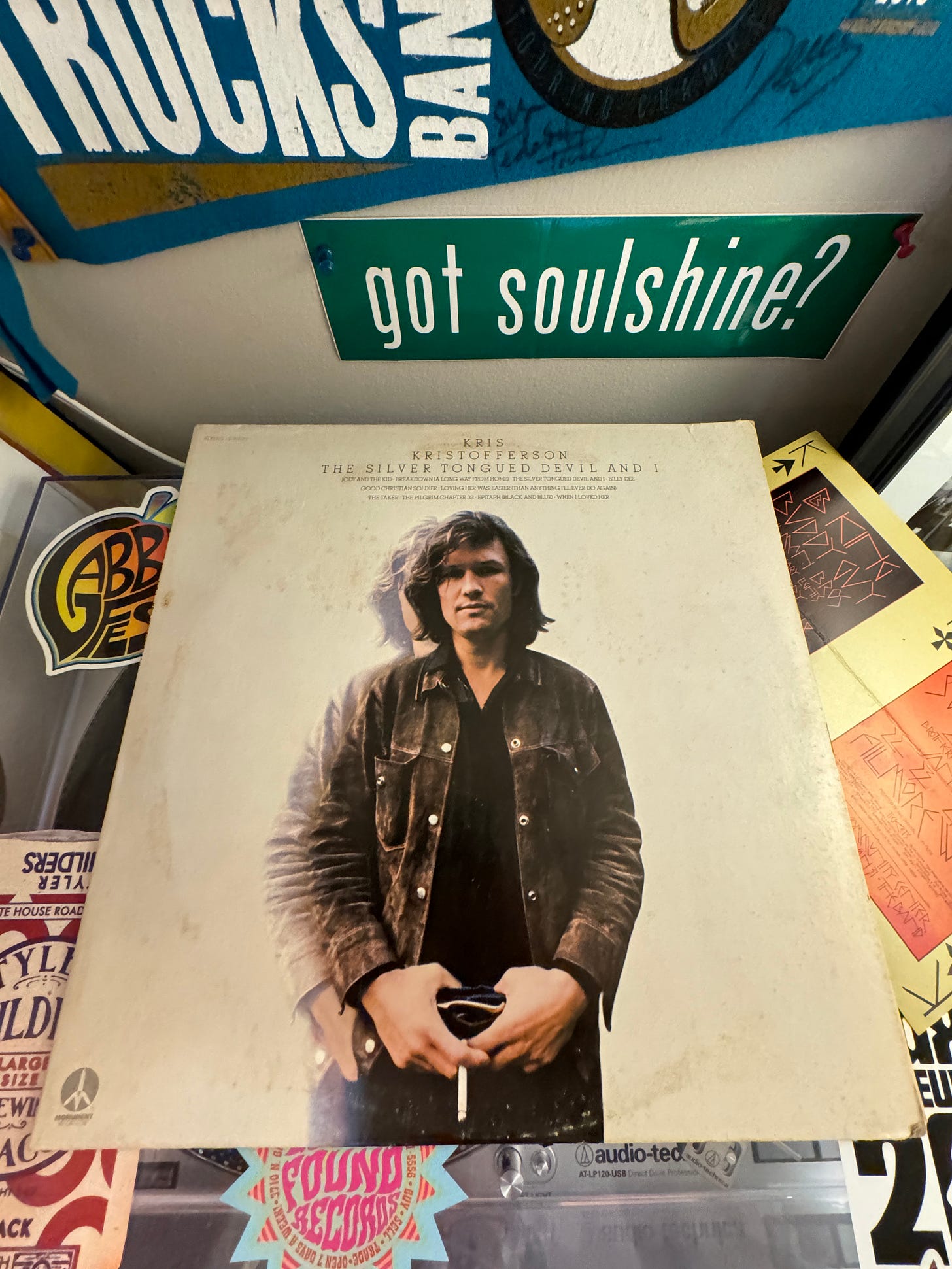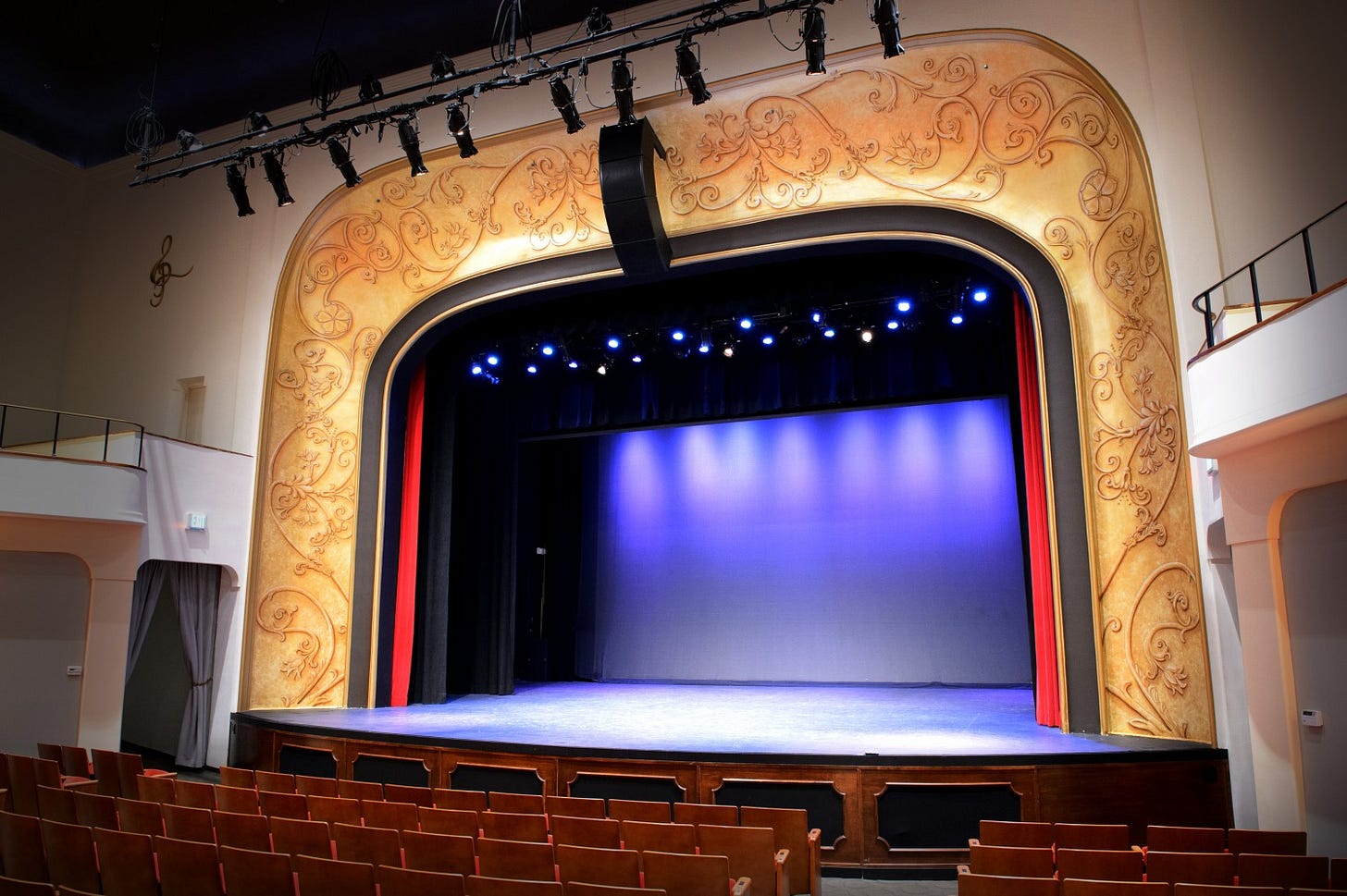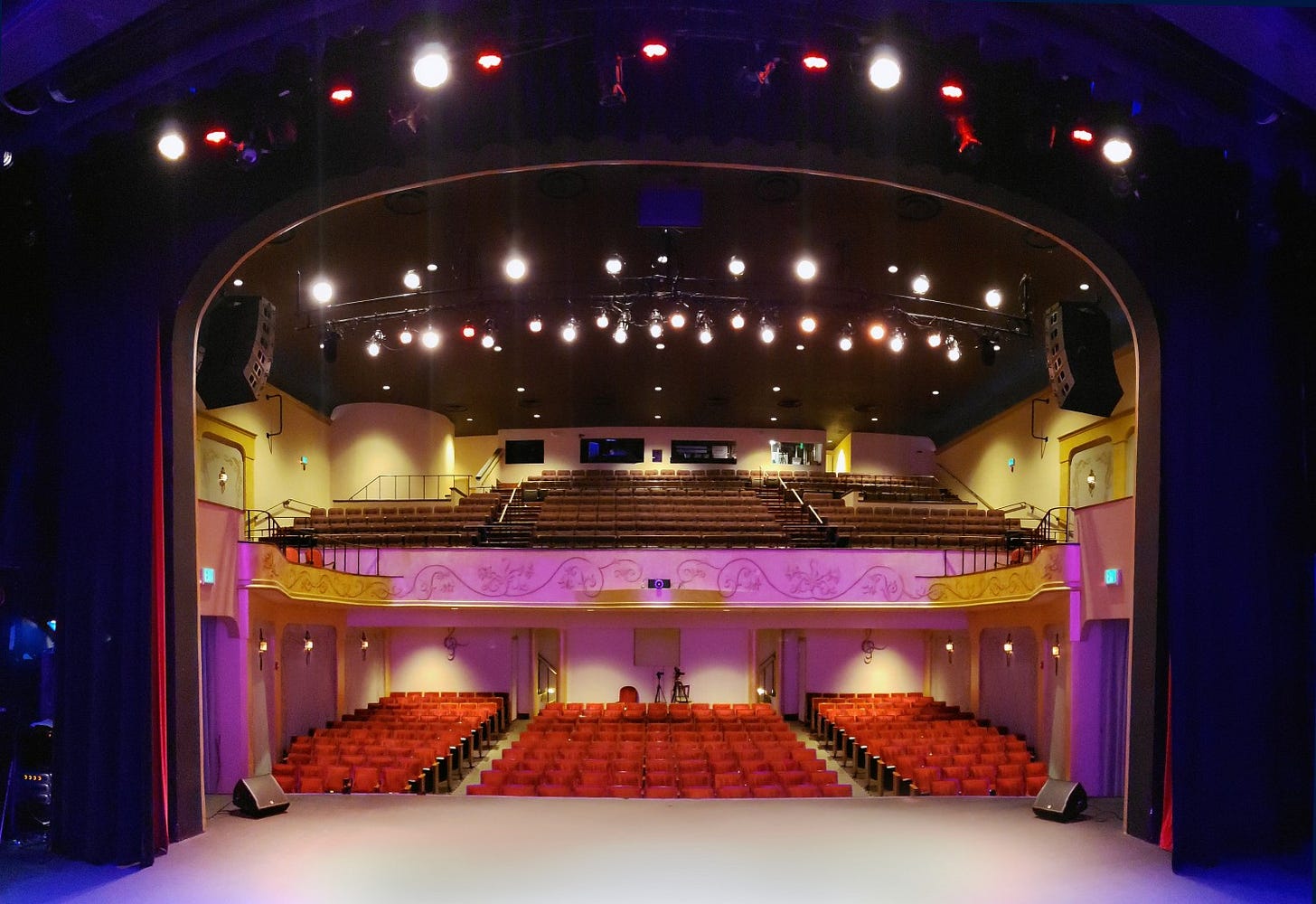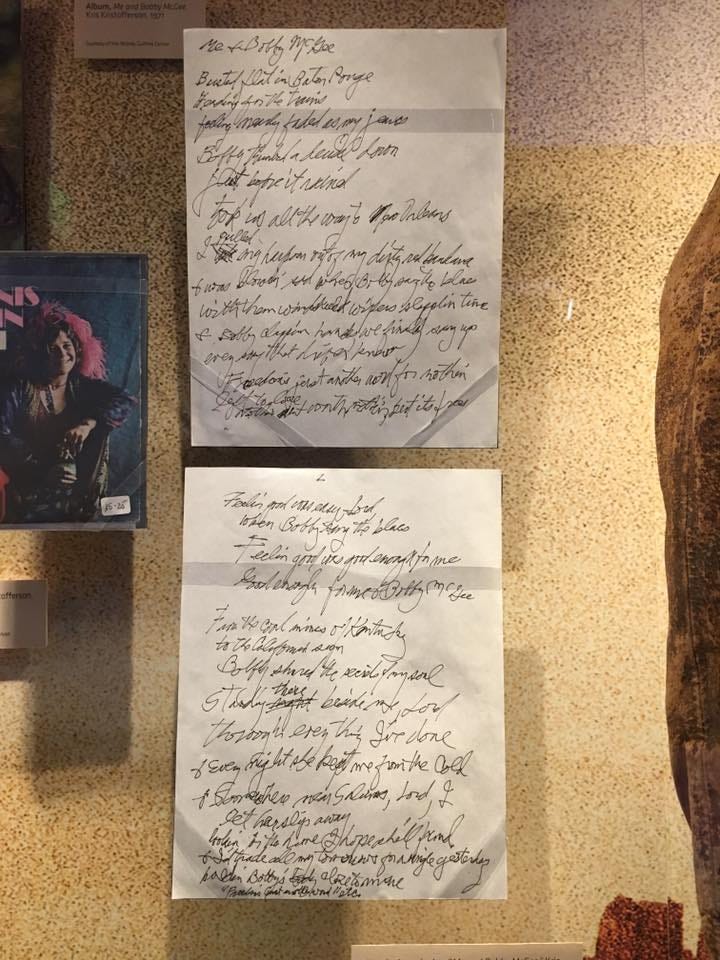I have been chasing that magic ever since
Kris Kristofferson, my dad, and a concert that changed my life
I define my writing here as Conversation from the Crossroads of Southern music, history, and culture. At the core of that conversation is an exploration of how these crossroads shaped and defined my life.
In writing Long Live the ABB, I am reflecting on these intersections together with you. My hope is that you will find a piece of your own story in mine. Life is endlessly fascinating—exciting and scary sometimes—but fascinating nonetheless.
I like pointing out things I find interesting. And I love exploring the many ways we are connected. It’s my founding ethos here.
And that’s the gist of today’s post.
Kris Kristofferson’s Death Hit Me Hard
To say Kristofferson is important to me and to my understanding of what music was/is/could be is a monumental understatement. He is forever on my personal Mount Rushmore.
He was also one of my dad’s favorites. THE favorite actually.
Turns out his death felt like I was losing yet another a piece of ol’ Pat & Suzi (a decade+ after their deaths)
My folks’ records
My parents had excellent musical taste.
Their collection—Mom’s Beatles and Dad’s country & blues albums—were my entree into the magical world of music. It defined music for me from a young age.
And I can see four Kristofferson records in my mind’s eye: his debut Kristofferson (1970), The Silver Tongued Devil and I (1971), Jesus Was a Capricorn (1972), and Breakaway with Rita Coolidge (1974).
I can’t say I obsessed over these records like I did the Fabs, but some of those cuts burned into my core for sure.
And then I saw Kristofferson in concert.
I have been chasing that magic ever since.
I still have the stub: Saturday, August 12, 1989. I moved to college at UCF in Orlando the following week.
My expectations were low.1
By 1989, Kristofferson was no longer the massive star of the 1970s. His luster had faded considerably. He was 53 (my dad’s age, for crying out loud!)2
He was a member of the Highwaymen, sure, but he was lucky they invited him—he said so himself.
And the dude could never sing anyway. Washed up for sure.
I went as chance to hang out with my folks doing something we loved—live music.3
I left a changed man.
I can’t remember many specifics about the music. I think Kristofferson played a black Strat when he played electric guitar. Pretty sure he and the band were in various hues of black & gray as well. They certainly didn’t dress up for the gig.
The only song I specifically remember is “Sandinista” from his soon-to-be-released Third World Warrior (1990). I have a vague recollection of “Don’t Let the Bastards Get You Down” as well—it wasn’t that common to “curse” in songs back then.
He definitely sang “Me and Bobby McGee” and reviews mention he played “Sunday Morning Coming Down” and “The Burden of Freedom” (more on that).
While I don’t remember much of the music, the experience remains vivid.
There was no show at all. Just a half-dozen (or so) musicians playing their asses off.
As front man, Kristofferson exuded joy. He looked like a giant. He was talkative, but not overly so. He seemed to have a real respect for the audience, and we for him.4
A standing ovation earned a genuine encore.
Not the perfunctory—“Let’s walk off the stage for 5 minutes and come back out and play a song”—kind of encore…
a legit…
“We’re not leaving until you come back out and play another song!”
ENCORE
After an actual STANDING OVATION.
The show was scheduled for 90 minutes. It lasted 120. When they finished their set, the audience wouldn’t let the band leave. And they didn’t want to quit playing.5
A local newspaper reported:
The “high-energy show played to a packed house of enthusiastic fans, many of whom seemed to remember his old songs from younger, wilder days, and to appreciate the new ones that show he has mellowed and matured.
Kristofferson was a humble, gentle man who let the audience know what a good time he’s having sober these days.”6
And then the bus.
I remember being tired after the show ended. I mean, we worked hard to coax 30 minutes of extra music out of Kristofferson and crew.
The energy continued outside as we waited for the band. Another reporter shared what came next:
“As the band boarded the bus, about 50 fans crowded around the back door of the theatre hoping for autographs. When Kristofferson emerged, a woman gasped, ‘My God, there he is. He is so handsome!’”7
I was among that crowd and I remember the buzz distinctly.
The band emerged triumphant warriors, having left it all on the stage.
We were there to laud them. They deserved it.
I remember the woman who gasped. I also recall a mom & dad with two kids under 10 who waited to speak to Kris himself and express their gratitude. I still see him squatting down to speak to the kids.
It remains a top-10 concert experience.
I went thinking I was gonna see some dude well past his prime. I may have also thought Kristofferson might mail it in at the 600 seat Lyric Theatre in little ol’ Stuart, Florida.
I was wrong.
Really wrong.
I left with a renewed and lifelong appreciation for Kris Kristofferson and backing musicians in general.8
I learned that true professionals never phone in a performance.
I learned to pay close attention to the ensemble. You want to see how bands make the magic they do? Watch what’s going on on stage behind the star. Not only because they’re working hard too, but because the stage is where all the bullshit of the road pays off.9
“I travel for the money. I play for free,” the saying goes.
I also learned that old dudes could still kick-ass.
This opened up a whole new world for me as I thought I’d missed everything having been born a generation late. I missed all the good music. And I hadn’t even “discovered” the Allman Brothers yet. (That came in 1993.)
I found Kristofferson authentic. As real as they come.
Authenticity is a loaded term for music historians and musicologists—one of those “I know it when I see it” classifications. What I find authentic might be your idea of a Vegas lounge act. Authenticity is indefinable, therefore irrelevant to any formal intellectual argument.
Thus, I’ve never fully defined authenticity for myself.
But as I write this, I remember was something about the simplicity of that Kristofferson show that, years later, still feels very real to me. The band’s workaday stage presence, Kristofferson’s genuine humility, the tight playing, the way all that worked together to whip us into a frenzy demanding an encore. And a really electric experience afterwards.
I continue to favor this low-tech, leave-it-all-on-the-stage approach.
Closer to home
I mentioned earlier that pops was a huge Kristofferson fan. “Me and Bobby McGee” was his all-time favorite song. (He long wished for a compilation of versions, something Mom & I put together for him on cd in the early Napster era.10)
Dad and Kristofferson lived somewhat parallel lives.
They were born a year apart, 1935 and 36 respectively. They grew up in the South11—Dad in Babson Park, Florida, Kris in Brownsville, Texas. They graduated high school prior to the rock & roll era. Both graduated college and served in the military at the height of the Cold War.
After active duty.
Dad enrolled in law school at the University of Florida, where he met Mom. They married in 1968. I was born in 1971.
Kristofferson moved to Nashville to become a songwriter, wife and young family in tow.
Both got divorced and remarried in the early 70s. Kristofferson to Rita Coolidge. Dad & Mom remarried.
Both got sober in 1976.
Dad’s sobriety was significant to my childhood. I understood my life would’ve been much different had Dad not stopped drinking and I valued his commitment to stay sober.12 (A feeling I carry to this day for all folks actively staying sober.)
“Sunday Morning Coming Down” resonated with Dad. I suspect it was a reminder of the consequences of his drinking. The loneliness “of the Sunday smell of someone frying chicken,” the lament of things he’d “lost, somewhere, somehow along the way” in the throes of alcoholism.
And that’s another memory from that night.
Kristofferson celebrated his sobriety from stage.
“I’m sober these days. There’s not a chemical I would put in my body that would make me feel better than I am with you tonight—straight.”
One final connection: military service shaped their politics.
Kristofferson was in the midst of a particularly politically active period when he played Stuart. He had just returned from filming in Nicaragua and was very open about his politics that night. He thanked us for listening to his songs “even if you don’t agree.”
“There’s some important political stuff going on right now,” he said from stage. “Five Central American presidents have gotten together to try to control their destiny. If you believe that America stands for freedom and self-determination, let your congressmen know that you want to let these people alone.”
To my surprise, my hometown was open to his viewpoint. “Most of the 600-plus people reacted with cheers and applause. A man in the balcony booed. ‘Get out!’ a woman yelled at the man. The man and his two companions left,” reported the Julie Enders.
The Burden of Freedom
Freedom is a longstanding theme in American life and music.13 “Just another word for nothing left to lose,” Kristofferson sang on “Bobby McGee in 1970.
Two decades later he sang us a new charge, a responsibility.
“Lord, help me to shoulder,
the burden of freedom.
And give me the courage
to be what I can.”
These are definitely words I can get behind.
Lagniappes
Substack
Y’all stop and read these two right now. Seriously.
“Lighting a Candle for Kris Kristofferson” by Margo Price on Rawdoggin' Reality
“RIP, Kris Kristofferson” by Elizabeth Nelson on The Paranoid Style
Social Media
A wonderful tribute from Sierra Swan, daughter of Kristofferson’s longtime bandmate Billy Swan and former touring member of the Smashing Pumpkins.14
Obituaries
I found both of these pretty thorough tributes.
Kristofferson truly lived a remarkable life.
Expectations are the thief of joy.
Same age as I am right now (October 2024).
I’m 100% sure Dad paid for the tickets. (Not sure when I was first able to buy a $25 a ticket, but it wasn’t 1989.)
This is an important parallel to what I found when I started digging into the Allman Brothers Band.
I only remember this because I did a little research but it makes sense given my reaction to this show all these years later.
Sally Swartz, “Kristofferson gives Stuart big-city show,” Palm Beach Post 8/16/89.
Julie Enders, “Kristofferson’s concert packs political punch,” St. Lucie News Tribune 8/16/89.
I don’t have the exact lineup, but all of these guys played in Kristofferson’s road band in this era: Stephen Bruton – Guitar; Funky Donnie Fritts – Keyboards; Billy Swan – Guitar/vocals; Glen Clark – Keyboards/vocals; Tommy McClure – Bass; Sammy Creason – Drums.
Duane and Gregg toured “the garbage circuit of the South.”
It’s amazing how hard this task was prior to the digital age.
I define that as states of the former Confederacy.
Sadly, alcoholism ended up killing my sister and an overdose ended up killing my brother.
Billy Swan sat in with the Pumpkins one year when they played the Ryman.









One of my favorite tracks on the 7 cd Skydog Retrospective box set is Sam Samudio's (with Duane Allman in the session) version of Me and Bobby McGee, because it's such a great song.
Thanks for sharing that experience Bob...that was a special concert for sure. I crossed paths with him pre covid at a show at DAR in DC that I was working. It was an Emmylou Harris tribute gig produced by Blackbird Productions in September 2016. There were a lot of good folks on that show, but the only one I could remember without looking at the artist list was Kris. He came up in the balcony and chatted with the camera crew for awhile..the only artist to do that. We did a day of camera rehearsals and then the show. I was on a long lens out in front. Here's the Rolling Stone review with a video clip. www.rollingstone.com/music/music-country/emmylou-harris-tribute-concert-recorded-for-live-album-dvd-112768/